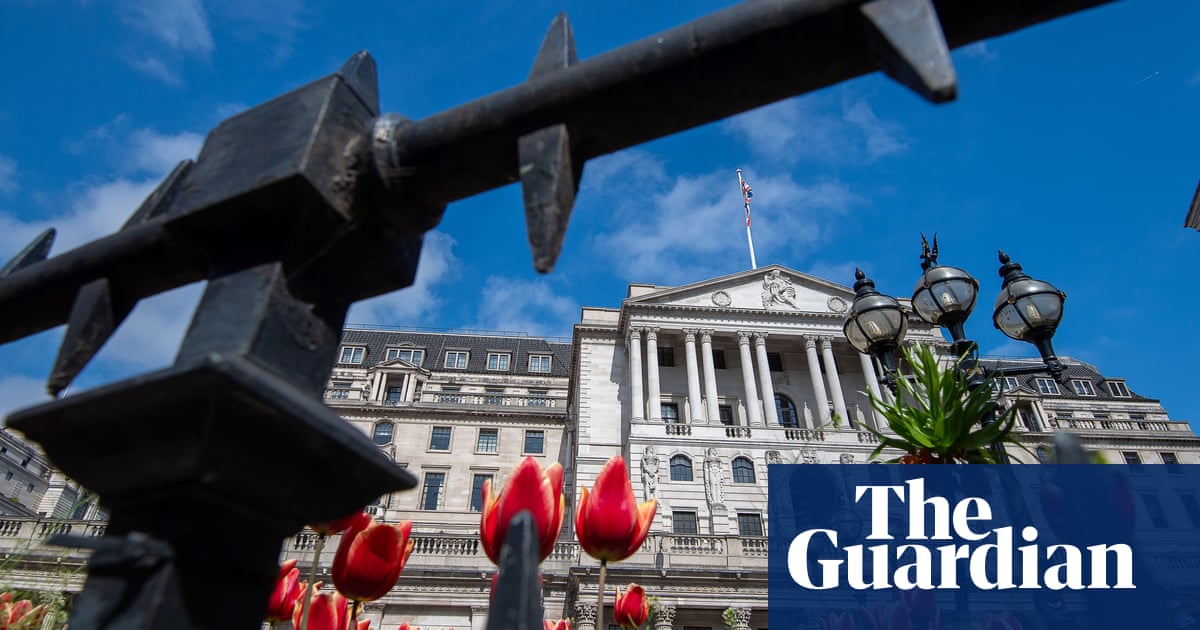Bank of England policymakers have cut interest rates by a quarter point to 4.25% to cushion the UK economy against the impact of Donald Trump’s trade war.
The widely expected move from the Bank’s monetary policy committee (MPC), its fourth cut since last August, also carried a warning that the UK economy would slow by a further 0.3% over the next two years in addition to dramatic cuts to its forecasts earlier this year.
In a blow to the chancellor,Rachel Reeves, the MPC said a combination of uncertainty surrounding the impact of US trade policy and clouds hanging over the UK economy meant economic growth would be almost stagnant for the rest of the year.
Economic growth “is judged to have slowed and is expected to remain subdued in the near term”, the Bank said.
In a split vote, with two of the nine-member MPC voting for a bigger 0.5 percentage point cut and two voting to keep rates held at 4.5%, the Bank signalled a high degree of caution about the number of interest rate cuts over the rest of the year.
Before the rates announcement, financial markets expected at least two further quarter-point cuts in borrowing costs this year.
However, concern that inflation will persist above a 2% target into 2026 led the National Institute of Economic and Social Research tosay this weekthat the Bank would be limited to just one cut this year.
The Bank’s governor, Andrew Bailey, said: “Inflationary pressures have continued to ease so we have been able to cut rates again today. The past few weeks have shown how unpredictable the global economy can be.
“That’s why we need to stick to a gradual and careful approach to further rate cuts. Ensuring low and stable inflation is our top priority.”
The Bank said its latest quarterly forecasts were based on the current tariff situation and did not take account of a proposed deal between government ministers and the White House,expected to be announcedon Thursday.
The UK is in negotiations with Washington about potentially winning an exemption from the 25% import charges that Trump has imposed on foreign cars and steel, in exchange for concessions.
But the chancellor has made clear that even if the UK secures a carve-out, the country would still be affected by the global slowdown expected to result from the trade war.
As well as monitoring the impact of trade policy, the Bank’s rate-setters said Reeves’s £25bn increase in employer national insurance contributions, which came into force last month, would affect employment, wages and prices, though it remained unclear to what extent.
MPC members were more concerned that a spike in inflation this year, largely due to higher council tax and utility bills, would provoke a disproportionate response from consumers already battered by a long period of rising prices.
Inflation is expected to peak in the third quarter at an average 3.5%, down from previous forecasts of 3.7%, largely in response to cheaper goods being redirected to the UK from China and other countries hit by US tariffs.
“World export prices are expected to be materially weaker, particularly in China,” the Bank said, adding: “The current overall impact of trade developments on the UK is therefore likely to be disinflationary than inflationary.”
Despite the lower peak in inflation, households could fear a more persistent rise in prices and focus their spending on essential items, limiting the amount of disposable income spent on big-ticket goods, depressing the economy further.
Inflation is not expected to ease to the MPC’s 2% target until spring 2027.
The Bank’s outlook follows a run of downbeat data on the UK economy, with surveys suggestingconsumerandbusiness confidenceis weakening.
The Bank said the result would be “subdued” growth in business investment, which is likely to put a brake on hoped-for increases in the UK’s productivity.
